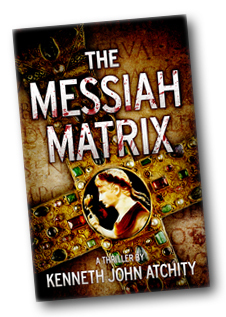Kenneth Atchity's Blog, page 234
June 21, 2012
Join My FREE Webinar Today at 2:30 p.m. (EDT)
What makes a good author’s representative?

Sometimes a writer signs with an agent, manager, or attorney and is
so elated to have done so that it doesn’t occur to him that he’s signed
with someone that will not advance his dream of publication or
production. But how do you know before you sign? How do you know how to
narrow the list? Based on decades in both publishing and entertainment,
Dr. Atchity will share with you his observations about what makes a good
author’s representative and how to identify the good ones—as well as
how to avoid the ones who will waste your time.
About the Presenter
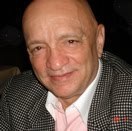 Dr. Atchity is the author of 15 books, including A Writer’s Time,
Dr. Atchity is the author of 15 books, including A Writer’s Time,
Writing Treatments That Sell, and How to Publish Your Novel. He’s worked
successfully in nearly every area of the publishing and entertainment
business, and has spent his lifetime helping writers get started with
and improve their careers. As founder and head of Atchity Entertainment
International, Inc., The Writer’s Lifeline, Inc., including Atchity
Productions and Story Merchant, and The Louisiana Wave Studio, LLC. he
has produced nearly 30 films in the past 20 years for major studios,
television broadcasters, and independent distribution. He is currently
nominated for an Emmy for “The Kennedy Detail,” based on the New York
Times bestselling book he developed. For nearly twenty years before, as
professor of literature and teacher of creative writing at Occidental
College and UCLA, he helped literally hundreds of writers find a market
for their work by bringing their craft and technique to the level of
their ambition and vision. During his time at Occidental, he also served
as a regular reviewer for The Los Angeles Times Book Review.
Register Now
June 21, 2012 at 02:30PM



Sometimes a writer signs with an agent, manager, or attorney and is
so elated to have done so that it doesn’t occur to him that he’s signed
with someone that will not advance his dream of publication or
production. But how do you know before you sign? How do you know how to
narrow the list? Based on decades in both publishing and entertainment,
Dr. Atchity will share with you his observations about what makes a good
author’s representative and how to identify the good ones—as well as
how to avoid the ones who will waste your time.
About the Presenter
 Dr. Atchity is the author of 15 books, including A Writer’s Time,
Dr. Atchity is the author of 15 books, including A Writer’s Time, Writing Treatments That Sell, and How to Publish Your Novel. He’s worked
successfully in nearly every area of the publishing and entertainment
business, and has spent his lifetime helping writers get started with
and improve their careers. As founder and head of Atchity Entertainment
International, Inc., The Writer’s Lifeline, Inc., including Atchity
Productions and Story Merchant, and The Louisiana Wave Studio, LLC. he
has produced nearly 30 films in the past 20 years for major studios,
television broadcasters, and independent distribution. He is currently
nominated for an Emmy for “The Kennedy Detail,” based on the New York
Times bestselling book he developed. For nearly twenty years before, as
professor of literature and teacher of creative writing at Occidental
College and UCLA, he helped literally hundreds of writers find a market
for their work by bringing their craft and technique to the level of
their ambition and vision. During his time at Occidental, he also served
as a regular reviewer for The Los Angeles Times Book Review.
Register Now
June 21, 2012 at 02:30PM

Published on June 21, 2012 00:00
June 20, 2012
Guest Post: Dealing with Your "Inner Critic" by Dennis Palumbo
Hollywood on the Couch
The inside scoop on Tinseltown, USA
by Dennis Palumbo
Self-criticism is a two-edged sword.
 Among the majority of my creative patients — TV and film writers, directors, actors, etc., a primary concern is the struggle against their “inner critic.” By that I mean the persistent, sometimes harsh and almost always shaming “voice” that belittles or invalidates their work. Indeed, the term “inner critic” is such a well-known concept in our culture that millions of dollars are spent on books, DVD’s, online classes and seminars promising to silence, or even banish altogether, his punishing element of most people’s inner world. There are two problems with this approach: first, the goal of killing off the self-critical, judgmental part of your psyche confirms the idea that there’s something wrong with you that needs to be fixed. It suggests that there’s a perfectable “you” in the future who’s unencumbered by such conflicts.
Among the majority of my creative patients — TV and film writers, directors, actors, etc., a primary concern is the struggle against their “inner critic.” By that I mean the persistent, sometimes harsh and almost always shaming “voice” that belittles or invalidates their work. Indeed, the term “inner critic” is such a well-known concept in our culture that millions of dollars are spent on books, DVD’s, online classes and seminars promising to silence, or even banish altogether, his punishing element of most people’s inner world. There are two problems with this approach: first, the goal of killing off the self-critical, judgmental part of your psyche confirms the idea that there’s something wrong with you that needs to be fixed. It suggests that there’s a perfectable “you” in the future who’s unencumbered by such conflicts.
Not to mention my second objection, which is that it isn’t even possible. Unquestionably, there’s nothing more painful about the creative process than struggling against feelings of self-doubt, even self-loathing. I’ve worked with patients who literally hate everything they create — it’s not good enough, funny enough, smart enough, commercial enough. Even those with a more balanced view of their output acknowledge the stress of continually having to keep deeply critical inner voices at bay just to get through the damn thing.
“Killing off” your inner critic won’t work; it isn’t even desirable. It’s part of who you are. A necessary part. As much as your enthusiasm, your work habits, your loves and hates, your joys and regrets. Because, like these other aspects of your emotional life, an inner critic is a two-edged sword.
Think of it this way: the same inner critic that judges our work so severely provides us with the ability to discern our likes and dislikes, to form opinions, to make decisions. It reinforces the faith in our subjective experience that allows us to choose this rather than that.
We need a sense of judgment to navigate in the world. The amount and intensity of that judgment, as with most things, lies along a continuum. Hopefully, we possess neither too much, nor too little.
Imagine waiting to cross the street at a busy intersection: With too little judgment, you might ignore the “Don’t Walk” sign and get run over; with too much judgment, you stand frozen even when the sign reads “Walk,” and therefore never get anywhere.
What I’m trying to suggest here is that we don’t judge our having an inner judge too harshly. Doing creative work in the face of a persistent inner critic is draining enough. To compound the problem by blaming yourself for being engaged in the struggle is ridiculous.
Remember, too, what I said about your inner critic being a two-edged sword. Because if we can accept with self-compassion this troubling aspect of ourselves, we might even learn something.
I’m thinking of an example from my own experience as a patient in therapy. This was many years ago, when I was struggling with some very painful issues, specifically a rather profound fear of failure that seemed unaffected by my outward success. The sessions were so gut-wrenching, I thought about quitting therapy.
Yet I kept coming, week after week, much to my own surprise. When I mentioned this to my therapist, he suggested that while the issues underlying my fear of failure were indeed painful and difficult, it was this same fear of failure that kept me coming back to therapy every week. In other words, the same thing that was causing the problem was providing the determination to keep slugging away at it. I just wouldn’t quit.
That’s when I realized what a two-edged sword my particular problem was. Like the ancient concept of yin and yang, almost every aspect of our emotional life has both an affirming and an invalidating component. Our job, then, is to examine an issue that troubles us---a harsh inner critic, for example---and learn what is both positive and negative about it, in terms of our work and our life.
If we approach our inner critic from this perspective, that of a life-long process of examination, we can co-exist with it. That along with feeling the pain of its intense scrutiny, we also develop the courage to challenge the self-defeating meanings we give to that pain. This has always been the artist’s struggle. What Rollo May calls “the courage to create.”
Or, to put it bluntly: You’re an artist. Which means, you’re your own worst critic. Join the club.


The inside scoop on Tinseltown, USA
by Dennis Palumbo
Self-criticism is a two-edged sword.
 Among the majority of my creative patients — TV and film writers, directors, actors, etc., a primary concern is the struggle against their “inner critic.” By that I mean the persistent, sometimes harsh and almost always shaming “voice” that belittles or invalidates their work. Indeed, the term “inner critic” is such a well-known concept in our culture that millions of dollars are spent on books, DVD’s, online classes and seminars promising to silence, or even banish altogether, his punishing element of most people’s inner world. There are two problems with this approach: first, the goal of killing off the self-critical, judgmental part of your psyche confirms the idea that there’s something wrong with you that needs to be fixed. It suggests that there’s a perfectable “you” in the future who’s unencumbered by such conflicts.
Among the majority of my creative patients — TV and film writers, directors, actors, etc., a primary concern is the struggle against their “inner critic.” By that I mean the persistent, sometimes harsh and almost always shaming “voice” that belittles or invalidates their work. Indeed, the term “inner critic” is such a well-known concept in our culture that millions of dollars are spent on books, DVD’s, online classes and seminars promising to silence, or even banish altogether, his punishing element of most people’s inner world. There are two problems with this approach: first, the goal of killing off the self-critical, judgmental part of your psyche confirms the idea that there’s something wrong with you that needs to be fixed. It suggests that there’s a perfectable “you” in the future who’s unencumbered by such conflicts.Not to mention my second objection, which is that it isn’t even possible. Unquestionably, there’s nothing more painful about the creative process than struggling against feelings of self-doubt, even self-loathing. I’ve worked with patients who literally hate everything they create — it’s not good enough, funny enough, smart enough, commercial enough. Even those with a more balanced view of their output acknowledge the stress of continually having to keep deeply critical inner voices at bay just to get through the damn thing.
“Killing off” your inner critic won’t work; it isn’t even desirable. It’s part of who you are. A necessary part. As much as your enthusiasm, your work habits, your loves and hates, your joys and regrets. Because, like these other aspects of your emotional life, an inner critic is a two-edged sword.
Think of it this way: the same inner critic that judges our work so severely provides us with the ability to discern our likes and dislikes, to form opinions, to make decisions. It reinforces the faith in our subjective experience that allows us to choose this rather than that.
We need a sense of judgment to navigate in the world. The amount and intensity of that judgment, as with most things, lies along a continuum. Hopefully, we possess neither too much, nor too little.
Imagine waiting to cross the street at a busy intersection: With too little judgment, you might ignore the “Don’t Walk” sign and get run over; with too much judgment, you stand frozen even when the sign reads “Walk,” and therefore never get anywhere.
What I’m trying to suggest here is that we don’t judge our having an inner judge too harshly. Doing creative work in the face of a persistent inner critic is draining enough. To compound the problem by blaming yourself for being engaged in the struggle is ridiculous.
Remember, too, what I said about your inner critic being a two-edged sword. Because if we can accept with self-compassion this troubling aspect of ourselves, we might even learn something.
I’m thinking of an example from my own experience as a patient in therapy. This was many years ago, when I was struggling with some very painful issues, specifically a rather profound fear of failure that seemed unaffected by my outward success. The sessions were so gut-wrenching, I thought about quitting therapy.
Yet I kept coming, week after week, much to my own surprise. When I mentioned this to my therapist, he suggested that while the issues underlying my fear of failure were indeed painful and difficult, it was this same fear of failure that kept me coming back to therapy every week. In other words, the same thing that was causing the problem was providing the determination to keep slugging away at it. I just wouldn’t quit.
That’s when I realized what a two-edged sword my particular problem was. Like the ancient concept of yin and yang, almost every aspect of our emotional life has both an affirming and an invalidating component. Our job, then, is to examine an issue that troubles us---a harsh inner critic, for example---and learn what is both positive and negative about it, in terms of our work and our life.
If we approach our inner critic from this perspective, that of a life-long process of examination, we can co-exist with it. That along with feeling the pain of its intense scrutiny, we also develop the courage to challenge the self-defeating meanings we give to that pain. This has always been the artist’s struggle. What Rollo May calls “the courage to create.”
Or, to put it bluntly: You’re an artist. Which means, you’re your own worst critic. Join the club.

Published on June 20, 2012 00:00
June 19, 2012
Brett Battles' Get SICK, Project Eden No. 1, for Free for Your Kindle or Kindle Ap June 19-21

The
Project Eden Sage Continues in
PALE
HORSE
and
get
SICK
Free
on Kindle
Today
thru Thursday


PALE HORSE, Project
Eden No. 3
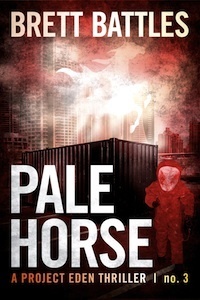
And I looked, and behold a pale
horse; and his name that sat on him was
Death, and Hell followed with
him.
—Revelations
6:8
A simple push of a button and the world will never be the
same.
Martina Gable returns home
from college to spend Christmas break with her family, but the relaxing
vacation she expects is not even close to what she'll get.
Sanjay, a young man in Mumbai
who knows more than he should about Project Eden’s plan, will do whatever he
can to keep Kusum, the girl he loves, alive and safe.
A boy named Brandon Ash runs
for his life in the hills of Montana, wanting only to see his family again.
But first there is Daniel, the
boy’s father, who watches Olivia Silva’s finger hover over the enter key that
will decide the fate of humanity.
Do you think you’re safe?
Where
to find PALE HORSE:
Kindle
US • Nook
• Kindle
UK • Kindle
Germany
Kindle
France • Kindle
Spain • Kindle
Italy
If you haven't read SICK or EXIT 9 yet,
you should read those first. To that end...
Get SICK, Project Eden No. 1, for Free for Your Kindle or Kindle
Ap June 19-21
To celebrate the release of PALE HORSE,
I'm making the Kindle version of SICK free for three days at Amazon.com.
(Don't have a Kindle? No problem. You can download a free Kindle ap for your
computer, tablet, or smart phone here.)
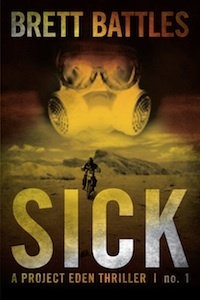 Daniel Ash wakes after
Daniel Ash wakes aftermidnight to the cry of his daughter. Just a bad dream, he thinks. She’s had
them before. Yet he can’t help but worry when she cries out again as he pads
down the hallway. Stepping through her doorway, he expects to find her
sitting up in bed, frightened by a nightmare.
But the nightmare is his. It’s real. And it's just beginning...
Something is burning Ash's daughter alive. Something horrible
that is spreading beyond the walls of their home, and taking no prisoners.
Thirty seconds later, Ash will discover his daughter isn’t the only one in
his family infected, and as his world spins, coming apart at the seams, a
team of armed men in biohazard suits bursts into his house.
But these aren’t the good guys.
They haven’t come to save Ash’s family. They’ve come to separate them, to
finish what they started.
The problem is Ash refuses to disappear. He wants only one
thing: to find those responsible.
Because humanity is on the brink of execution.
And man is pulling the trigger.
Where
to find SICK:
Kindle
US • Kindle
UK • Kindle
Germany
Kindle
France • Kindle
Spain • Kindle
Italy
For Print Fans, THE DESTROYED is Now Available in Trade
Paperback
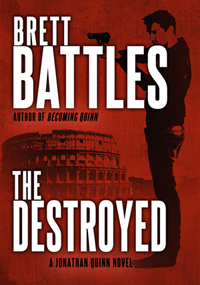
Get the latest Quinn novel in print form at
Createspace.com
Amazon.com
It will also be available through Barnesandnoble.com in the
coming weeks.
WHERE TO FIND ME
Brettbattles.com

Published on June 19, 2012 00:00
Brett Battles' Get SICK, Project Eden No. 1, for Free for Your Kindle or Kindle Ap June 19-21

The
Project Eden Sage Continues in
PALE
HORSE
and
get
SICK
Free
on Kindle
Today
thru Thursday


PALE HORSE, Project
Eden No. 3

And I looked, and behold a pale
horse; and his name that sat on him was
Death, and Hell followed with
him.
—Revelations
6:8
A simple push of a button and the world will never be the
same.
Martina Gable returns home
from college to spend Christmas break with her family, but the relaxing
vacation she expects is not even close to what she'll get.
Sanjay, a young man in Mumbai
who knows more than he should about Project Eden’s plan, will do whatever he
can to keep Kusum, the girl he loves, alive and safe.
A boy named Brandon Ash runs
for his life in the hills of Montana, wanting only to see his family again.
But first there is Daniel, the
boy’s father, who watches Olivia Silva’s finger hover over the enter key that
will decide the fate of humanity.
Do you think you’re safe?
Where
to find PALE HORSE:
Kindle
US • Nook
• Kindle
UK • Kindle
Germany
Kindle
France • Kindle
Spain • Kindle
Italy
If you haven't read SICK or EXIT 9 yet,
you should read those first. To that end...
Get SICK, Project Eden No. 1, for Free for Your Kindle or Kindle
Ap June 19-21
To celebrate the release of PALE HORSE,
I'm making the Kindle version of SICK free for three days at Amazon.com.
(Don't have a Kindle? No problem. You can download a free Kindle ap for your
computer, tablet, or smart phone here.)
 Daniel Ash wakes after
Daniel Ash wakes aftermidnight to the cry of his daughter. Just a bad dream, he thinks. She’s had
them before. Yet he can’t help but worry when she cries out again as he pads
down the hallway. Stepping through her doorway, he expects to find her
sitting up in bed, frightened by a nightmare.
But the nightmare is his. It’s real. And it's just beginning...
Something is burning Ash's daughter alive. Something horrible
that is spreading beyond the walls of their home, and taking no prisoners.
Thirty seconds later, Ash will discover his daughter isn’t the only one in
his family infected, and as his world spins, coming apart at the seams, a
team of armed men in biohazard suits bursts into his house.
But these aren’t the good guys.
They haven’t come to save Ash’s family. They’ve come to separate them, to
finish what they started.
The problem is Ash refuses to disappear. He wants only one
thing: to find those responsible.
Because humanity is on the brink of execution.
And man is pulling the trigger.
Where
to find SICK:
Kindle
US • Kindle
UK • Kindle
Germany
Kindle
France • Kindle
Spain • Kindle
Italy
For Print Fans, THE DESTROYED is Now Available in Trade
Paperback

Get the latest Quinn novel in print form at
Createspace.com
Amazon.com
It will also be available through Barnesandnoble.com in the
coming weeks.
WHERE TO FIND ME
Brettbattles.com

Published on June 19, 2012 00:00
Register For My FREE Webinar, June 21, 2012 at 2:30 p.m. (EDT)
What makes a good author’s representative?

Sometimes a writer signs with an agent, manager, or attorney and is
so elated to have done so that it doesn’t occur to him that he’s signed
with someone that will not advance his dream of publication or
production. But how do you know before you sign? How do you know how to
narrow the list? Based on decades in both publishing and entertainment,
Dr. Atchity will share with you his observations about what makes a good
author’s representative and how to identify the good ones—as well as
how to avoid the ones who will waste your time.
About the Presenter
 Dr. Atchity is the author of 15 books, including A Writer’s Time,
Dr. Atchity is the author of 15 books, including A Writer’s Time,
Writing Treatments That Sell, and How to Publish Your Novel. He’s worked
successfully in nearly every area of the publishing and entertainment
business, and has spent his lifetime helping writers get started with
and improve their careers. As founder and head of Atchity Entertainment
International, Inc., The Writer’s Lifeline, Inc., including Atchity
Productions and Story Merchant, and The Louisiana Wave Studio, LLC. he
has produced nearly 30 films in the past 20 years for major studios,
television broadcasters, and independent distribution. He is currently
nominated for an Emmy for “The Kennedy Detail,” based on the New York
Times bestselling book he developed. For nearly twenty years before, as
professor of literature and teacher of creative writing at Occidental
College and UCLA, he helped literally hundreds of writers find a market
for their work by bringing their craft and technique to the level of
their ambition and vision. During his time at Occidental, he also served
as a regular reviewer for The Los Angeles Times Book Review.
Register Now
June 21, 2012 at 02:30PM



Sometimes a writer signs with an agent, manager, or attorney and is
so elated to have done so that it doesn’t occur to him that he’s signed
with someone that will not advance his dream of publication or
production. But how do you know before you sign? How do you know how to
narrow the list? Based on decades in both publishing and entertainment,
Dr. Atchity will share with you his observations about what makes a good
author’s representative and how to identify the good ones—as well as
how to avoid the ones who will waste your time.
About the Presenter
 Dr. Atchity is the author of 15 books, including A Writer’s Time,
Dr. Atchity is the author of 15 books, including A Writer’s Time, Writing Treatments That Sell, and How to Publish Your Novel. He’s worked
successfully in nearly every area of the publishing and entertainment
business, and has spent his lifetime helping writers get started with
and improve their careers. As founder and head of Atchity Entertainment
International, Inc., The Writer’s Lifeline, Inc., including Atchity
Productions and Story Merchant, and The Louisiana Wave Studio, LLC. he
has produced nearly 30 films in the past 20 years for major studios,
television broadcasters, and independent distribution. He is currently
nominated for an Emmy for “The Kennedy Detail,” based on the New York
Times bestselling book he developed. For nearly twenty years before, as
professor of literature and teacher of creative writing at Occidental
College and UCLA, he helped literally hundreds of writers find a market
for their work by bringing their craft and technique to the level of
their ambition and vision. During his time at Occidental, he also served
as a regular reviewer for The Los Angeles Times Book Review.
Register Now
June 21, 2012 at 02:30PM

Published on June 19, 2012 00:00
June 18, 2012
The Messiah Matrix Lands In My Mailbox on Books Bones and Buffy.com

 Welcome to Lucky 13 In My Mailbox, hosted by The Story Siren!
Welcome to Lucky 13 In My Mailbox, hosted by The Story Siren!
To what lengths would the Vatican go to suppress the secret origins of its power?
The Messiah Matrix is a myth-shattering
thriller whose protagonists delve into the secrets of the past—and
expose those who hide them still.
A renowned scholar-monsignor is killed in
a mysterious hit-and-run in Rome. A Roman coin is recovered from a
wreck off the coast of ancient Judea. It’s up to his young American
protégé–a Jesuit priest–and a vivacious, brilliant archaeologist to
connect these seemingly disparate events and unravel the tapestry that
conceals in plain view the greatest mystery in the ecclesiastical world.
Together they pursue their passion for truth—while fighting to control their passion for each other.
What they uncover is an ancient Roman
imperial stratagem so controversial the Curia fears it could undermine
the very foundations of the Roman Catholic faith.
From the ancient port of Caesarea to
Rome’s legendary catacombs and the sacred caves of Cumae, this
contemporary novel follows their exhilarating quest to uncover the truth
about the historical existence of the real “Christian Savior.”
The Messiah Matrix may prove to be one of the most thought-provoking
books ever written.
Classical scholar and Yale Ph.D. Dr.
Kenneth John Atchity is the only author alive today capable of creating
this literary and historically-based masterpiece.
Those are some bold statements! Don’t you want to read it to see if they’re true?
What’s in your mailbox this week?

Published on June 18, 2012 00:00
The Messiah Matrix Lands In My Mailbox on Books Bones and Buffy.com

 Welcome to Lucky 13 In My Mailbox, hosted by The Story Siren!
Welcome to Lucky 13 In My Mailbox, hosted by The Story Siren!
To what lengths would the Vatican go to suppress the secret origins of its power?
The Messiah Matrix is a myth-shattering
thriller whose protagonists delve into the secrets of the past—and
expose those who hide them still.
A renowned scholar-monsignor is killed in
a mysterious hit-and-run in Rome. A Roman coin is recovered from a
wreck off the coast of ancient Judea. It’s up to his young American
protégé–a Jesuit priest–and a vivacious, brilliant archaeologist to
connect these seemingly disparate events and unravel the tapestry that
conceals in plain view the greatest mystery in the ecclesiastical world.
Together they pursue their passion for truth—while fighting to control their passion for each other.
What they uncover is an ancient Roman
imperial stratagem so controversial the Curia fears it could undermine
the very foundations of the Roman Catholic faith.
From the ancient port of Caesarea to
Rome’s legendary catacombs and the sacred caves of Cumae, this
contemporary novel follows their exhilarating quest to uncover the truth
about the historical existence of the real “Christian Savior.”
The Messiah Matrix may prove to be one of the most thought-provoking
books ever written.
Classical scholar and Yale Ph.D. Dr.
Kenneth John Atchity is the only author alive today capable of creating
this literary and historically-based masterpiece.
Those are some bold statements! Don’t you want to read it to see if they’re true?
What’s in your mailbox this week?

Published on June 18, 2012 00:00
June 17, 2012
The First Four Ed Noon Private Eye Novels Are Now Available on Amazon Kindle!
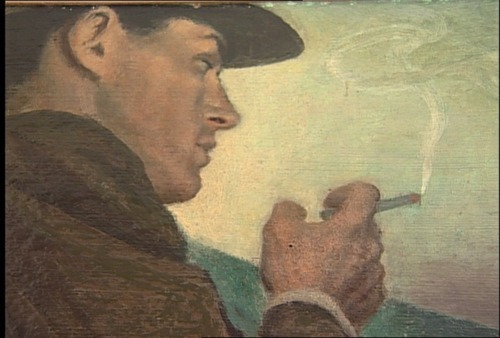
In 1953, Michael Avallone’s first book, THE TALL DOLORES was published; a
fast, funny mystery adventure set in Manhattan. In that book, we are
introduced to ED NOON, private eye, a wise-cracking, movie and
baseball-loving tough guy with a soft heart whose adventures often
tipped towards the surreal. Between 1953 and 1990, in 36 novels, a
handful of novellas and countless short stories, Ed Noon fought the good
fight… usually out of a little midtown office so tiny and cramped that
he called it the MOUSE AUDITORIUM.
Welcome to the Official
Website of Michael Avallone. In 2012, we’ll be bringing Ed Noon, and
other great characters from the Michael Avallone collection, back to the
public.
http://mouseauditorium.tumblr.com

Published on June 17, 2012 22:26
June 16, 2012
Register for My FREE Webinar, June 21, at 2:30 pm (EDT)
What makes a good author’s representative?

Sometimes a writer signs with an agent, manager, or attorney and is
so elated to have done so that it doesn’t occur to him that he’s signed
with someone that will not advance his dream of publication or
production. But how do you know before you sign? How do you know how to
narrow the list? Based on decades in both publishing and entertainment,
Dr. Atchity will share with you his observations about what makes a good
author’s representative and how to identify the good ones—as well as
how to avoid the ones who will waste your time.
About the Presenter
 Dr. Atchity is the author of 15 books, including A Writer’s Time,
Dr. Atchity is the author of 15 books, including A Writer’s Time,
Writing Treatments That Sell, and How to Publish Your Novel. He’s worked
successfully in nearly every area of the publishing and entertainment
business, and has spent his lifetime helping writers get started with
and improve their careers. As founder and head of Atchity Entertainment
International, Inc., The Writer’s Lifeline, Inc., including Atchity
Productions and Story Merchant, and The Louisiana Wave Studio, LLC. he
has produced nearly 30 films in the past 20 years for major studios,
television broadcasters, and independent distribution. He is currently
nominated for an Emmy for “The Kennedy Detail,” based on the New York
Times bestselling book he developed. For nearly twenty years before, as
professor of literature and teacher of creative writing at Occidental
College and UCLA, he helped literally hundreds of writers find a market
for their work by bringing their craft and technique to the level of
their ambition and vision. During his time at Occidental, he also served
as a regular reviewer for The Los Angeles Times Book Review.
Register Now
June 21, 2012 at 02:30PM



Sometimes a writer signs with an agent, manager, or attorney and is
so elated to have done so that it doesn’t occur to him that he’s signed
with someone that will not advance his dream of publication or
production. But how do you know before you sign? How do you know how to
narrow the list? Based on decades in both publishing and entertainment,
Dr. Atchity will share with you his observations about what makes a good
author’s representative and how to identify the good ones—as well as
how to avoid the ones who will waste your time.
About the Presenter
 Dr. Atchity is the author of 15 books, including A Writer’s Time,
Dr. Atchity is the author of 15 books, including A Writer’s Time, Writing Treatments That Sell, and How to Publish Your Novel. He’s worked
successfully in nearly every area of the publishing and entertainment
business, and has spent his lifetime helping writers get started with
and improve their careers. As founder and head of Atchity Entertainment
International, Inc., The Writer’s Lifeline, Inc., including Atchity
Productions and Story Merchant, and The Louisiana Wave Studio, LLC. he
has produced nearly 30 films in the past 20 years for major studios,
television broadcasters, and independent distribution. He is currently
nominated for an Emmy for “The Kennedy Detail,” based on the New York
Times bestselling book he developed. For nearly twenty years before, as
professor of literature and teacher of creative writing at Occidental
College and UCLA, he helped literally hundreds of writers find a market
for their work by bringing their craft and technique to the level of
their ambition and vision. During his time at Occidental, he also served
as a regular reviewer for The Los Angeles Times Book Review.
Register Now
June 21, 2012 at 02:30PM

Published on June 16, 2012 00:00
June 15, 2012
My Addiction Discusses The Messiah Matrix
Interview with Kenneth John Atchity
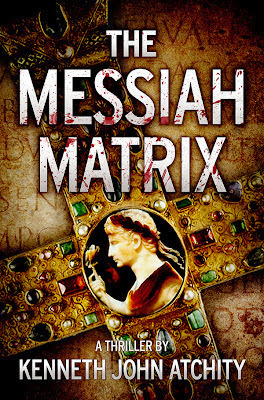
Interview with
Kenneth John Atchity Author of Homer's Iliad: The Shield of Memory - Which was his Ph.D. Dissertation. The work
was awarded Yale Graduate School's Highest Academic Honor - The Porter Prize;
and was later published by Southern Illinois University Press (Edited by John
Gardner). Mentors at Yale Included
Thomas Bergin, Thomas Greene, A. Bartlett Giamatti, Richard Ellinger, Eric
Segal and Lowry Nelson Jr.
His Twenty Books Include:
·
Homer: Critical Essays (G.K.Hall),
·
The Renaissance Reader (HarperCollins),
·
The Classical Greek Reader (Harper-Oxford University
Press),
·
Italian
Literature: Roots & Branches (Yale University Press),
·
A Writer’s Time (W.W. Norton)
·
Seven Ways to Die (with William Diehl) (Story Merchant
Books)
·
And The Classical Roman
Reader (Harper-Oxford)
Kenneth represents writers of both fiction and nonfiction. He
accounts for numerous bestsellers and movies both produced in television and on
the big screen. In 2011 he was nominated for an Emmy Award for Producing “The
Kennedy Detail.”
We are very pleased to introduce our readers to his latest
addition to storytelling which is his first novel called The Messiah Matrix.
Kenneth – thank you so much for giving me this interview.
From the interviews I have done so far over the past year I’m fairly positive
that you must be one of the most aspiring authors I have ever done an interview
on.
Thank
you, Nadine. I’m definitely aspiring!
1.
As a start I always like for authors to tell us a
bit about themselves. Where did your journey start, what made you start
writing?
I’m
sure it was my mother egging me on from the kitchen as I sat at the table
turning an essay into a short story. She came up with some preposterous plots,
but I modified them and made them work. Her mantra was “go for it”!
2.
I have to ask (and I know I have asked some other
authors the same thing), how
do you approach your writing? A lot of writers build their story. They first
develop their characters, then develop their plot and then start writing.
Others just jump into it from the word go.
Every
project is different, but the FIRST THING I always do is to carve out time each
day to work on my current ‘creative project.’ Without time, we have nothing—and
it is time that gets work done.
3.
Another question that I have asked before but
would like your input on is how do you treat sequel writing? As an author
(unpublished but striving) myself, I
had written my 1st novel, whilst I was going / am going through the
editing process I started work on its sequel. I found that as my story progressed there was
some stuff that came up that I wanted to add into the first novel which I
thought would tie them together. Do you experience similar notions? If you did
how do you deal with it?
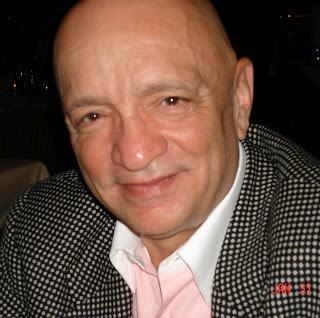
I don’t have the
‘sequel problem’ you’re experiencing. I focus on the story at hand, which is
challenge enough in itself. I can see how that would get complicated though,
and would have to understand in more detail to comment usefully.
4.
From basic reviews I had obtained on The Messiah
Matrix I concluded that the novel covers a great story that is layered with
romance, believable characters, wonderful settings and an unpredictable ending.
Would you mind elaborating a bit on what readers could expect?
Readers
can expect to be drawn into one of the greatest mysteries of the last two
thousand years—how did the story of Jesus Christ get started? What is its
provable historical roots?
5.
Where can readers follow your novels and latest
updates?
The
Messiah Matrix has its own website, www.messiahmatrix.com.
We’d love nothing more than questions from readers on the blog section of that
website. For my progress in general, check out kenatchity.blogspot.com and
storymerchant.com. Messiah and Seven
Ways to Die also have their own Facebook pages.
6.
The novel has reached number one on kindle. How
do you feel about that?
I
was happily surprised, especially in England where it’s high on many lists and
selling very well despite the fact that we haven’t begun to market it yet.
7.
Some readers claim that this novel was far better
than the Da Vinci Code. This is high praise, what are your views?
Of
course I knew the book would be compared to Dan Brown, whom I admire. My view
is that the issues Messiah Matrix
deals with are much more monumental—the very origins of Christianity—than Da Vinci, but I admire his mastery of
detail, which I couldn’t hope to equal.
8.
Where did the idea come from for the writing of
the Messiah Matrix?
It
came from my Roman Catholic upbringing, and the doubts I began having at the
age of 15 about the “facts” of the life of Jesus, and the “rules” of the
Catholic Church. For example, everyone who ate meat on Fridays went to hell for
all eternity if they didn’t receive confession before they died. THEN the
Church changed the rules and said it’s okay to eat meat on Friday. So what
happened to all those souls in hell for eating meat on Friday? The answer is
that they’re still there because those were the rules when they were alive.
Hmmm, I thought, what kind of God acts like that? Do these rules, in fact, have
anything to do with God at all? Read the novel and find out.
9.
As a Christian, what can readers expect to
discover with regards to the roots of Christianity, anti-Christian perspectives
and general religious views.
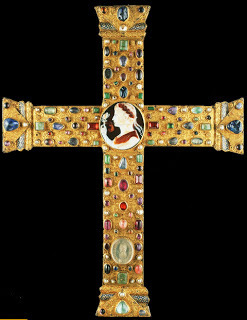
The
book is very respectful of Christianity, and its basic peaceful doctrines; it’s
much less tolerant of organized religion, which I personally believe is one of
the greatest causers of violence the world has ever known. If read properly,
the book actually acclaims that Christianity was founded in a magnificent way
that should make everyone even prouder to be a Christian.
10.
You recently did an article on CNN religion’s
site that read “the Jesus debate: man vs. myth. The article covers Timothy
Freke’s discovery of a religious image that some would call obscene. From the
description it was of a drawing from a third-century amulet depicting a naked
man nailed to a cross. The name on the amulet however isn’t that of Jesus of
Nazareth, instead it was a pseudonym for Osiris-Dionysus, a pagan god in
ancient Mediterranean culture. How was this article received within the public?
What’s your personal conclusion?
Why
is a man hanging on a cross obscene if it’s Orpheus (not Osiris) and not
obscene if it’s Jesus? Geez, this kind of stuff makes me nuts. The name on the
amulet is actually Orpheus—Bacchus (another name of Dionysus).
1 1.
As an author, can you give struggling authors any
advice on the way forward?
The
way forward is persistence. Never give up. And, as the late great Ray Bradbury
said, “Start writing more. It’ll get rid of all those moods you’re having!”
1 2.
Final quote/ inspiration note.
“Go for it!” and read The Messiah Matrix, and review it for amazon.


Interview with
Kenneth John Atchity Author of Homer's Iliad: The Shield of Memory - Which was his Ph.D. Dissertation. The work
was awarded Yale Graduate School's Highest Academic Honor - The Porter Prize;
and was later published by Southern Illinois University Press (Edited by John
Gardner). Mentors at Yale Included
Thomas Bergin, Thomas Greene, A. Bartlett Giamatti, Richard Ellinger, Eric
Segal and Lowry Nelson Jr.
His Twenty Books Include:
·
Homer: Critical Essays (G.K.Hall),
·
The Renaissance Reader (HarperCollins),
·
The Classical Greek Reader (Harper-Oxford University
Press),
·
Italian
Literature: Roots & Branches (Yale University Press),
·
A Writer’s Time (W.W. Norton)
·
Seven Ways to Die (with William Diehl) (Story Merchant
Books)
·
And The Classical Roman
Reader (Harper-Oxford)
Kenneth represents writers of both fiction and nonfiction. He
accounts for numerous bestsellers and movies both produced in television and on
the big screen. In 2011 he was nominated for an Emmy Award for Producing “The
Kennedy Detail.”
We are very pleased to introduce our readers to his latest
addition to storytelling which is his first novel called The Messiah Matrix.
Kenneth – thank you so much for giving me this interview.
From the interviews I have done so far over the past year I’m fairly positive
that you must be one of the most aspiring authors I have ever done an interview
on.
Thank
you, Nadine. I’m definitely aspiring!
1.
As a start I always like for authors to tell us a
bit about themselves. Where did your journey start, what made you start
writing?
I’m
sure it was my mother egging me on from the kitchen as I sat at the table
turning an essay into a short story. She came up with some preposterous plots,
but I modified them and made them work. Her mantra was “go for it”!
2.
I have to ask (and I know I have asked some other
authors the same thing), how
do you approach your writing? A lot of writers build their story. They first
develop their characters, then develop their plot and then start writing.
Others just jump into it from the word go.
Every
project is different, but the FIRST THING I always do is to carve out time each
day to work on my current ‘creative project.’ Without time, we have nothing—and
it is time that gets work done.
3.
Another question that I have asked before but
would like your input on is how do you treat sequel writing? As an author
(unpublished but striving) myself, I
had written my 1st novel, whilst I was going / am going through the
editing process I started work on its sequel. I found that as my story progressed there was
some stuff that came up that I wanted to add into the first novel which I
thought would tie them together. Do you experience similar notions? If you did
how do you deal with it?

I don’t have the
‘sequel problem’ you’re experiencing. I focus on the story at hand, which is
challenge enough in itself. I can see how that would get complicated though,
and would have to understand in more detail to comment usefully.
4.
From basic reviews I had obtained on The Messiah
Matrix I concluded that the novel covers a great story that is layered with
romance, believable characters, wonderful settings and an unpredictable ending.
Would you mind elaborating a bit on what readers could expect?
Readers
can expect to be drawn into one of the greatest mysteries of the last two
thousand years—how did the story of Jesus Christ get started? What is its
provable historical roots?
5.
Where can readers follow your novels and latest
updates?
The
Messiah Matrix has its own website, www.messiahmatrix.com.
We’d love nothing more than questions from readers on the blog section of that
website. For my progress in general, check out kenatchity.blogspot.com and
storymerchant.com. Messiah and Seven
Ways to Die also have their own Facebook pages.
6.
The novel has reached number one on kindle. How
do you feel about that?
I
was happily surprised, especially in England where it’s high on many lists and
selling very well despite the fact that we haven’t begun to market it yet.
7.
Some readers claim that this novel was far better
than the Da Vinci Code. This is high praise, what are your views?
Of
course I knew the book would be compared to Dan Brown, whom I admire. My view
is that the issues Messiah Matrix
deals with are much more monumental—the very origins of Christianity—than Da Vinci, but I admire his mastery of
detail, which I couldn’t hope to equal.
8.
Where did the idea come from for the writing of
the Messiah Matrix?
It
came from my Roman Catholic upbringing, and the doubts I began having at the
age of 15 about the “facts” of the life of Jesus, and the “rules” of the
Catholic Church. For example, everyone who ate meat on Fridays went to hell for
all eternity if they didn’t receive confession before they died. THEN the
Church changed the rules and said it’s okay to eat meat on Friday. So what
happened to all those souls in hell for eating meat on Friday? The answer is
that they’re still there because those were the rules when they were alive.
Hmmm, I thought, what kind of God acts like that? Do these rules, in fact, have
anything to do with God at all? Read the novel and find out.
9.
As a Christian, what can readers expect to
discover with regards to the roots of Christianity, anti-Christian perspectives
and general religious views.

The
book is very respectful of Christianity, and its basic peaceful doctrines; it’s
much less tolerant of organized religion, which I personally believe is one of
the greatest causers of violence the world has ever known. If read properly,
the book actually acclaims that Christianity was founded in a magnificent way
that should make everyone even prouder to be a Christian.
10.
You recently did an article on CNN religion’s
site that read “the Jesus debate: man vs. myth. The article covers Timothy
Freke’s discovery of a religious image that some would call obscene. From the
description it was of a drawing from a third-century amulet depicting a naked
man nailed to a cross. The name on the amulet however isn’t that of Jesus of
Nazareth, instead it was a pseudonym for Osiris-Dionysus, a pagan god in
ancient Mediterranean culture. How was this article received within the public?
What’s your personal conclusion?
Why
is a man hanging on a cross obscene if it’s Orpheus (not Osiris) and not
obscene if it’s Jesus? Geez, this kind of stuff makes me nuts. The name on the
amulet is actually Orpheus—Bacchus (another name of Dionysus).
1 1.
As an author, can you give struggling authors any
advice on the way forward?
The
way forward is persistence. Never give up. And, as the late great Ray Bradbury
said, “Start writing more. It’ll get rid of all those moods you’re having!”
1 2.
Final quote/ inspiration note.
“Go for it!” and read The Messiah Matrix, and review it for amazon.

Published on June 15, 2012 00:00

